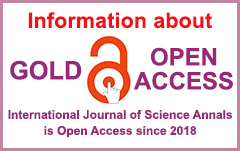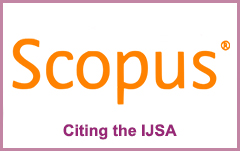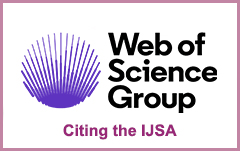Resistance to Post-traumatic Stress Reactions of Vulnerable Groups Engaged in Pandemic Liquidation
Melnyk Yu. B. 1,2,3, Stadnik A. V. 1,2,4,5, Pypenko I. S. 1,2,6
| 1 Kharkiv Regional Public Organization “Culture of Health” (KRPOCH), Ukraine
2 Scientific Research Institute KRPOCH, Ukraine
3 National Academy of the National Guard of Ukraine, Ukraine
4 Social-Psychological Center KRPOCH, Ukraine
5 Kharkiv National University of Internal Affairs, Kharkiv, Ukraine
6 Simon Kuznets Kharkiv National University of Economics, Ukraine |
Abstract
Background and Aim of Study: The increase in cases of post-traumatic stress reactions among vulnerable groups engaged in the pandemic liquidation, make the problem urgent for nowadays. The aim of the study: to reveal the peculiarities of mental traumatic influence on military-men engaged into the COVID-19 pandemic liquidation; detail the level of stress, anxiety and depression in order to develop further actions concerning mental support and psycho-prophylaxis.
Material and Methods: In order to conduct the research, we have engaged 334 military-men (of different categories: military-men for a regular term and military-men under a contract, officers (of the age from 18 to 40), who performed their duty of maintaining order together with the police. We have shortlisted 3 groups. The structured questionnaire consisted of questions grounded on the following methods: “Mississippi Scale for Estimating Post-Traumatic Reactions (military variant)”; “Depression Anxiety Stress Scales”; “Insomnia Severity Index”; Cronbach’s alpha is 0.817 (good internal consistency).
Results: By the results of using the Mississippi scale for estimating post-traumatic reactions (military variant), the following fact has been stated: among military-men experienced in battle actions, the quantity of people with PTSR indicators accounted for 1.79%, that is significantly less than among military-men inexperienced in battle actions (3.42%). We have also revealed some certain gender peculiarities.
Conclusions: Military-men experienced in battle actions display anxiety, depression, stress and sleep disorders considerably more rarely than military-men inexperienced in such. In our mind it is stipulated by the fact that committing professional duties in conditions of the COVID-19 pandemic is less stressful for military-men experienced in battle actions than the battle actions themselves which they are adapted to. Sleep disorders (the average point by “Insomnia Severity Index” methods) have been considerably higher among military-women, than among military-men in all the groups that is connected, with their higher extraversion and stress in the COVID-19 pandemic.
Keywords
pandemic, anxiety, depression, stress, military-men, COVID-19.
References
Ahaiev, N. A., Kokun, O. M., Pishko, I. O., Lozinska, N. S., Ostapchuk, V. V., & Tkachenko, V. V. (2016). Zbirnyk metodyk dlia diahnostyky nehatyvnykh psykhichnykh staniv viiskovosluzhbovtsiv [Collection of methods for diagnosing negative mental states of servicemen]. Кyiv: NDTs HP ZSU. [in Ukrainian]
Araújo de Oliveira, F. J., de Lima, L. S. A., Cidade, P. I. M., Nobre, C. B., & Neto, M. L. R. (2020). Impact of Sars-Cov-2 and its reverberation in global higher education and mental health. Psychiatry Research, 288(June), 112977. Retrieved from https://www.sciencedirect.com/science/article/pii/S0165178120307009 doi:10.1016/j.psychres.2020.112977
Bastien, C. H., Vallières, A., & Morin, C. M. (2001). Validation of the Insomnia Severity Index (ISI) as an outcome measure for insomnia research. Sleep Medicine, 2(4), 297–307. doi:10.1016/S1389-9457(00)00065-4
Brooks, S. K., Webster, R. K., Smith, L. E., Woodland, L., Wessely, S., Greenberg, N., & Ruban, G. J. (2020). The psychological impact of quarantine and how to reduce it: Rapid review of the evidence. The Lancet, 395(10227), 912–920. doi:10.1016/S0140-6736(20)30460-8
Cascella, M., Rajnik, M., Cuomo, A., Dulebohn, S. C., & Di Napoli, R. (2020). Features, evaluation and treatment coronavirus (COVID-19). StatPearls. Retrieved from https://pubmed.ncbi.nlm.nih.gov/32150360/
Dong, E., Du, H., & Gardner, L. (2020). An interactive web-based dashboard to track COVID-19 in real time. The Lancet Infectious Diseases, 20(5), 533–534. doi:10.1016/S1473-3099(20)30120-1
Fiorillo, A., & Gorwood, P. (2020). The consequences of the COVID-19 pandemic on mental health and implications for clinical practice. European Psychiatry, 63(1), e32, 1–2. doi:10.1192/j.eurpsy.2020.35
Greenberg, N., & Docherty, M., Gnanapragasam, S., & Wessely, S. (2020). Managing mental health challenges faced by healthcare workers during COVID-19 pandemic. The BMJ, 368, m1211. Retrieved from https://www.bmj.com/content/bmj/368/bmj.m1211.full.pdf doi:10.1136/bmj.m1211
Henry, J. D., & Crawford, J. R. (2005). The short-form version of the Depression Anxiety Stress Scales (DASS-21): Construct validity and normative data in a large non-clinical sample. The British Journal of Clinical Psychology, 44(2), 227–239. doi:10.1348/014466505X29657
Holmes, E. A., O’Connor, R. C., Perry, V. H., Tracey, I., Wessely, S., Arseneault, L., … Bullmore, E. (2020). Multidisciplinary research priorities for the COVID-19 pandemic: A call for action for mental health science. The Lancet Psychiatry, 7(6), 547–560. doi:10.1016/S2215-0366(20)30168-1
Johns Hopkins University, Coronavirus Resource Center. (2020). COVID-19 Dashboard by the Center for Systems Science and Engineering (CSSE). Retrieved from https://gisanddata.maps.arcgis.com/apps/opsdashboard/index.html#/bda7594740fd40299423467b48e9ecf6
Kaniasty, K. (2019). Social support, interpersonal, and community dynamics following disasters caused by natural hazards. Current Opinion in Psychology, 32, 105–109. doi:10.1016/j.copsyc.2019.07.026
Lauer, S. A., Grantz, K. H., Bi, Q., Jones, F. K., Zheng, Q., Meredith, H. R., … Lessler, J. (2020). The incubation period of coronavirus disease 2019 (COVID-19) from publicly reported confirmed cases: Estimation and application. Annals of Internal Medicine, 172(9), 577–582. doi:10.7326/M20-0504
Melnyk, Yu. B. (2020). Sotsialno-psykholohichni aspekty styhmatyzatsii viiskovosluzhbovtsiv yak mizhdystsyplinarna problema [Socio-psychological aspects of stigmatization of military-men as an interdisciplinary problem]. In O. O. Morozov (Ed.), Sluzhbovo-boiova diialnist Natsionalnoi hvardii Ukrainy: suchasnyi stan, problemy ta perspektyvy – Service and combat activity of the National Guard of Ukraine: current state, problems and prospects (pp. 48–49). Kharkiv, Ukraine: National Academy of the National Guard of Ukraine. [in Ukrainian]
Melnyk, Yu. B. (2019). Stigmatisation problems of military-men. International Journal of Education and Science, 2(4), 41. doi:10.26697/ijes.2019.4.27
Melnyk, Yu. B., Prykhodko, І. І., & Stadnik, A. V. (2019). Medical-psychological support of specialists’ professional activity in extreme conditions. Minerva Psichiatrica, 60(4), 158–168. doi:10.23736/S0391-1772.19.02025-9
Melnyk, Yu., & Stadnik, A. (2018). Mental health of a personality: diagnostics and prevention of mental disorders. International Journal of Education and Science, 1(3-4), 50. doi:10.26697/ijes.2018.3-4.37
Morganstein, J. C., & Ursano, R. J. (2020). Ecological disasters and mental health: Causes, consequences, and interventions. Frontiers in Psychiatry, 11, 1. doi:10.3389/fpsyt.2020.00001
Psychology Foundation of Australia (2018). Depression Anxiety Stress Scales (DASS). Retrieved from https://www2.psy.unsw.edu.au/dass
Remuzzi, A., & Remuzzi, G. (2020). COVID-19 and Italy: what next? The Lancet, 395(10231), 1225–1228. doi:10.1016/S0140-6736(20)30627-9
Rothan, H. A., & Byrareddy, S. N. (2020). The epidemiology and pathogenesis of coronavirus disease (COVID-19) outbreak. Journal of Autoimmunity, 109, 102433. Retrieved from https://www.sciencedirect.com/science/article/pii/S0896841120300469 doi:10.1016/j.jaut.2020.102433
Shigemura, J., Ursano, R. J., Morganstein, J. C., Kurosawa, M., & Benedek, D. M. (2020). Public responses to the novel 2019 coronavirus (2019-nCoV) in Japan: Mental health consequences and target populations. Psychiatry and Clinical Neurosciences, 74(4), 281–282. doi:10.1111/pcn.12988
Tan, W., Hao, F., McIntyre, R. S., Jiang, L., Jiang, X., Zhang, L., … Tam, W. (2020). Is returning to work during the COVID-19 pandemic stressful? A study on immediate mental health status and psychoneuroimmunity prevention measures of Chinese workforce. Brain, Behavior, and Immunity, 87, 84–92. Retrieved from https://www.sciencedirect.com/science/article/pii/S0889159120306036 doi:10.1016/j.bbi.2020.04.055
Information about the authors:
Melnyk Yuriy Borysovych – https://orcid.org/0000-0002-8527-4638; Doctor of Philosophy in Pedagogy, Associate Professor; Professor, National Academy of the National Guard of Ukraine; Founder and Chairman of the Board, KRPOCH; Director, Scientific Research Institute KRPOCH; Kharkiv, Ukraine.
Stadnik Anatoliy Volodymyrovych – https://orcid.org/0000-0002-1472-4224; Doctor of Philosophy in Medicine, Associate Professor, Kharkiv National University of Internal Affairs; Director, Social-Psychological Center KRPOCH; Kharkiv, Ukraine.
Pypenko Iryna Sergiivna – https://orcid.org/0000-0001-5083-540X; Doctor of Philosophy in Economics, Associate Professor, Simon Kuznets Kharkiv National University of Economics; Co-Director, Scientific Research Institute KRPOCH; Director, Educational Center KRPOCH; Kharkiv, Ukraine.
| |
Cite this article as:
APA
Melnyk, Yu. B., Stadnik, A. V., & Pypenko, I. S. (2020). Resistance to Post-traumatic Stress Reactions of Vulnerable Groups Engaged in Pandemic Liquidation. International Journal of Science Annals, 3(1), 35–44. https://doi.org/10.26697/ijsa.2020.1.5
Harvard
Melnyk, Yu. B., Stadnik, A. V., & Pypenko, I. S., 2020. "Resistance to Post-traumatic Stress Reactions of Vulnerable Groups Engaged in Pandemic Liquidation". International Journal of Science Annals, [online] 3(1), pp.35–44. viewed 30 June 2020, https://culturehealth.org/ijsa_archive/Vol._3,ijsa_No_1,_2020-5.pdf
Vancouver
Melnyk Yu. B., Stadnik A. V., Pypenko I. S. Resistance to Post-traumatic Stress Reactions of Vulnerable Groups Engaged in Pandemic Liquidation. International Journal of Science Annals [Internet]. 2020 [cited 30 June 2020]; 3(1):35–44. Available from: https://culturehealth.org/ijsa_archive/Vol._3,ijsa_No_1,_2020-5.pdf https://doi.org/10.26697/ijsa.2020.1.5












